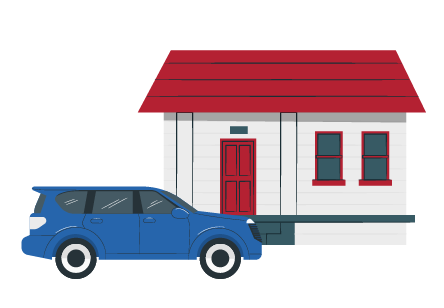You have multiple assets to protect, your home, car, and financial well-being, so insurance is always necessary. However, managing separate policies can be expensive and complicated. Bundling, which combines multiple coverages under one insurance carrier, is the solution that can simplify your finances, lower your premiums, and give you substantial savings. But is it the right move for you to bundle insurance? Keep reading to explore the pros, cons, and smart strategies behind auto insurance bundling.
What Does Insurance Bundling Mean?
Insurance bundling is buying multiple types of coverage, home, auto, renters, life, or even boat and RV insurance, from a single company. It's often called a multi-policy or multi-line discount. Insurance providers offer this to retain customers, but it also benefits policyholders with potential savings.
When you bundle individual policies, you simplify your insurance by having all coverage under one company. This means you have one bill to manage and one point of contact for customer service. Many insurance companies assign a dedicated agent to review annual policies and ensure your coverage meets your needs.
The main benefit of bundled insurance is the extra savings on combined insurance policies. Most insurers offer a 10% to 25% discount depending on the types of insurance policies. Despite recently rising base premiums, bundling discounts have stayed the same. It's a smart way to manage increasing insurance costs.
There is a trade-off: your policies are linked. Suppose you want to switch carriers for better service or pricing. In that case, you'll have to move all policy bundles together, which can limit flexibility. But for many, it's a practical and smart move that can save you hundreds of dollars.
What Types of Insurance Bundles Are Available?
Insurance bundles are individual coverage types packaged together under one policy. They simplify policy management, increase coverage, and often reduce overall premium costs. Insurers allow most policies to be customized. Some combinations are more popular because customers frequently need all types of insurance policies anyway.
Some Common Insurance Bundle Combinations are listed below.
Home Insurance and Auto Policies: The most common insurance bundle for homeowners who own cars.
Renters Insurance and Auto Policies: For renters with personal vehicles. This makes keeping track of insurance polices easy and covers the home and vehicle.
While the above are the most popular, your insurer probably offers more bundling options. Insurers often allow customized policies for customers financial protection needs.
Other types of policies that can be bundled but less frequently are listed below.
Vacation Home Policy: For second homes or seasonal properties.
RV Policy: This is for recreation vehicle owners who use their RVs for travel or leisure.
Boat Policy: For watercraft protection against damage, theft, and liability.
ATV Policy: For off-road vehicle owners using ATVs for recreation or utility.
Motorcycle Policy: For two wheel vehicles. Policies can cover bodily injury, property damage, and collision.
Life Policy: Part of a broader financial protection plan for families.
Flood Policy: Supplements homeowners insurance, especially in flood areas.
Umbrella Policy: Extends liability coverage across existing policies and adds extra protection frequently up to 1 million dollars.
Pet Policy: Assists with vet bills for dogs and cats.
Business Policy: For business owners, it combines property, liability, and employee coverage.
What are the Benefits of Bundling Insurance Policies?
Bundling insurance policies means buying multiple insurance products. These products can include a home, auto, or life insurance policy, from the same insurance provider. The benefits of bundling extend into several areas of premium savings, convenience, efficiency, and better customer service.
Operational Ease: When you have all your policies under one provider, you can manage all your coverages in one place. Policyholders can access and see all their policy features in one online portal. This reduces the hassle of dealing with multiple insurance carriers. Billing is also combined into one bill. This makes it easier to track and less likely to miss a payment.
Claims Efficiency: Bundling policies makes the claims process easier by allowing policyholders to deal with one company for multiple claims. This helps in events that affect more than one insurance policy, like a natural disaster that damages both a home and a vehicle. A single claims adjuster can handle related claims at the same time and resolve them faster for the customer.
Financial Benefits: Bundling may also qualify policyholders for a single deductible across multiple policies. Suppose a covered event affects more than one insured item. You might only pay one deductible for each policy instead of separate ones. Bundling may also give you access to higher liability limits, additional policies like roadside assistance, or optional add ons at discounted rates.
Service Consistency and Personalized Support: Having all your policies with one insurance carrier means quality customer service and comprehensive coverage. The insurance company can get to know the policyholders needs better. They can make personalized recommendations about their policies. This relationship allows for better-informed changes to your insurance policy terms.
Bundling your insurance policies means a versatile advantage that covers convenient claims handling, financial benefits, and better service. These all add up to a more seamless insurance experience and a bundled discount.
What are the Disadvantages of Bundling Insurance?
While bundling auto and home insurance can be convenient and save money, it's not always a smart choice for everyone.
A few scenarios where having your policies with separate companies is warranted are listed below.
Specialized Coverage Needs: Some homes and vehicles require specialized coverage that bundled policies don't offer. For example, high-value homes or properties in high-risk areas, flood zones or wildfire-prone areas, may need a specialized homeowners policy that isn't available from auto-only insurers. Luxury, collector, and antique cars often need tailored policies that aren't compatible with bundled options.
Drivers who are High Risk: High-risk drivers with multiple accidents or DUIs may find lower rates with high-risk auto insurance companies. These non-standard insurers offer lower rates than standard companies even with a bundled discount. Drivers with a clean driving record, even those with teenage drivers, may get better rates or more features like accident forgiveness by separating their auto and home policies.
Limited Product Offerings: Not all insurers offer the full range of insurance products needed for a comprehensive bundle. For example, an insurer may provide auto insurance but not life or umbrella insurance. This limits your ability to bundle coverage and may require you to buy a policy from another insurance company.
Not Enough Savings: Bundling doesn't always guarantee more savings. In some cases, the savings are small and not worth consolidating policies. When comparison shopping, you may find that bundled quotes from one provider may still be more expensive than separate quotes from different insurers. Insurance premiums vary widely based on underwriting models, and comparing standalone policies from multiple providers may find you more competitive insurance rates or better coverage.
Bundling isn't always the best option. You should assess your individual risk profile, coverage needs, and pricing scenarios to determine whether keeping separate policies is better for you.
Should You Bundle Auto and Home Insurance?
Bundling auto and home insurance is recommended because of all the benefits. Many insurance companies offer discounts to policyholders who bundle auto and home insurance, savings that can be over 10% on each policy. That's a big deal for those who want to manage their finances.
Besides the savings, bundling simplifies policy management by combining everything with one company. One point of contact for questions, claims, and policy changes.
Insurance companies view bundled policyholders as lower risk. That means lower rates or more coverage. But bundling isn't always the cheapest. Separate policies from different companies can sometimes cost less based on your risk profile and market options.
So, while bundling is good, compare bundled and standalone quotes to see what's best for you.



